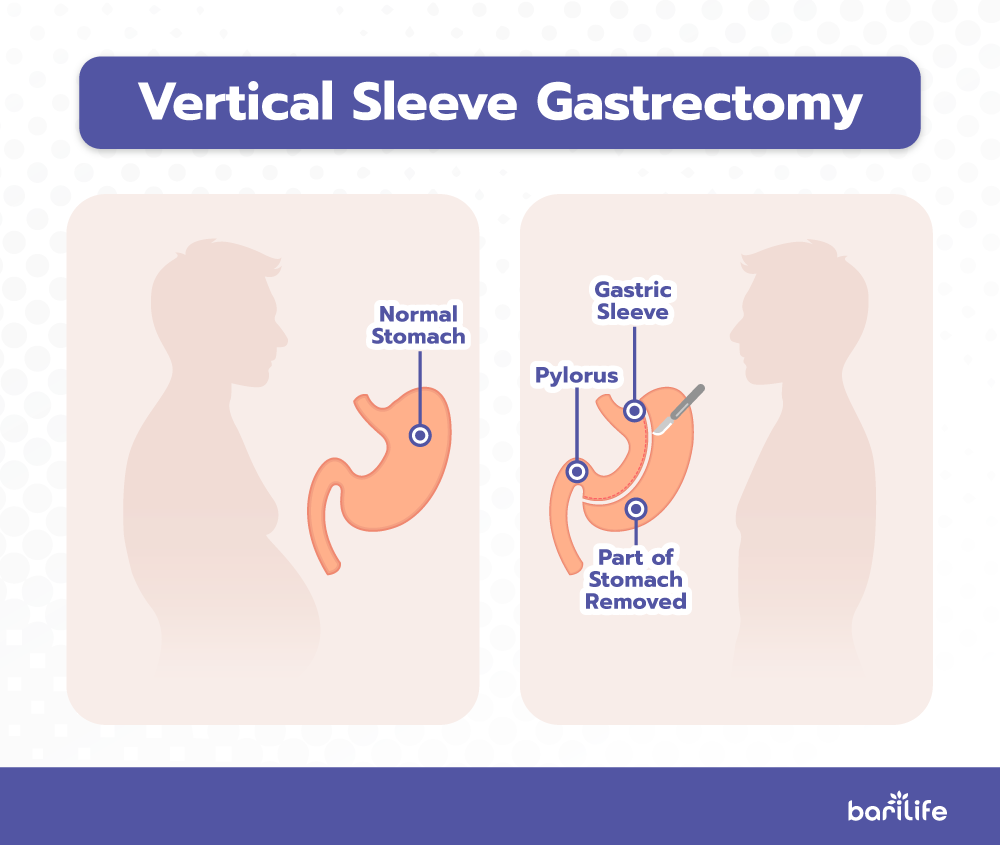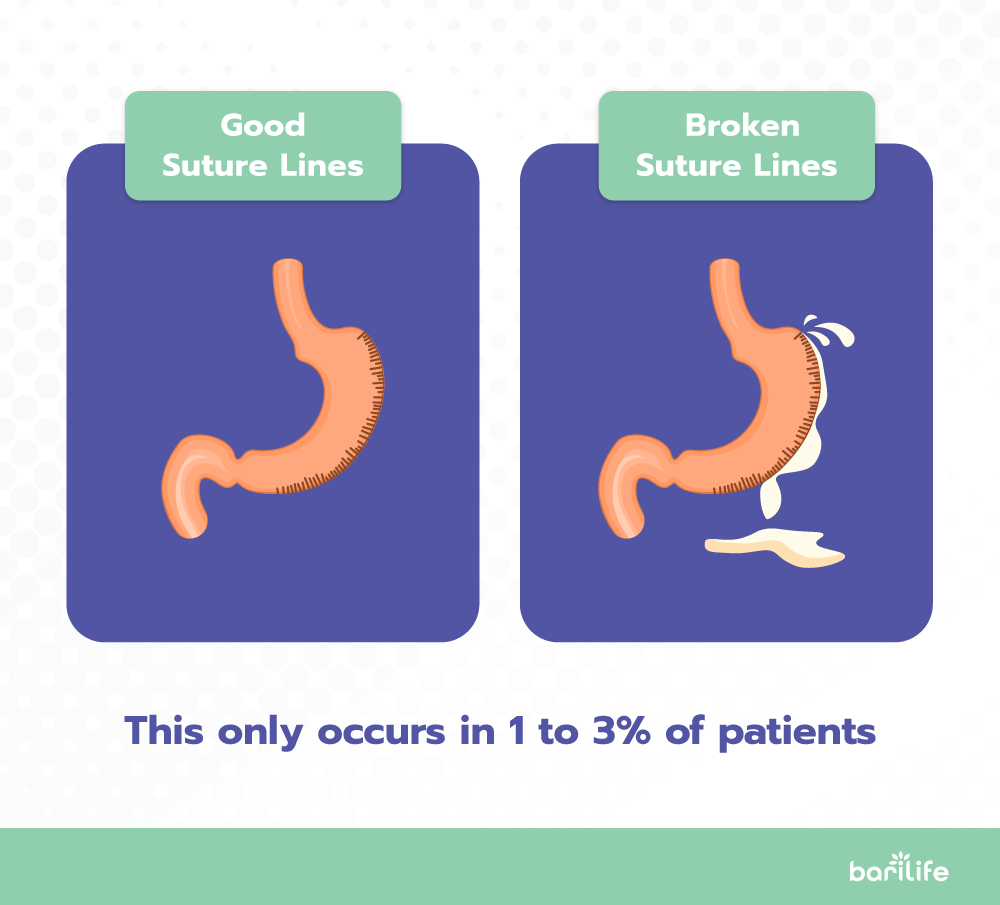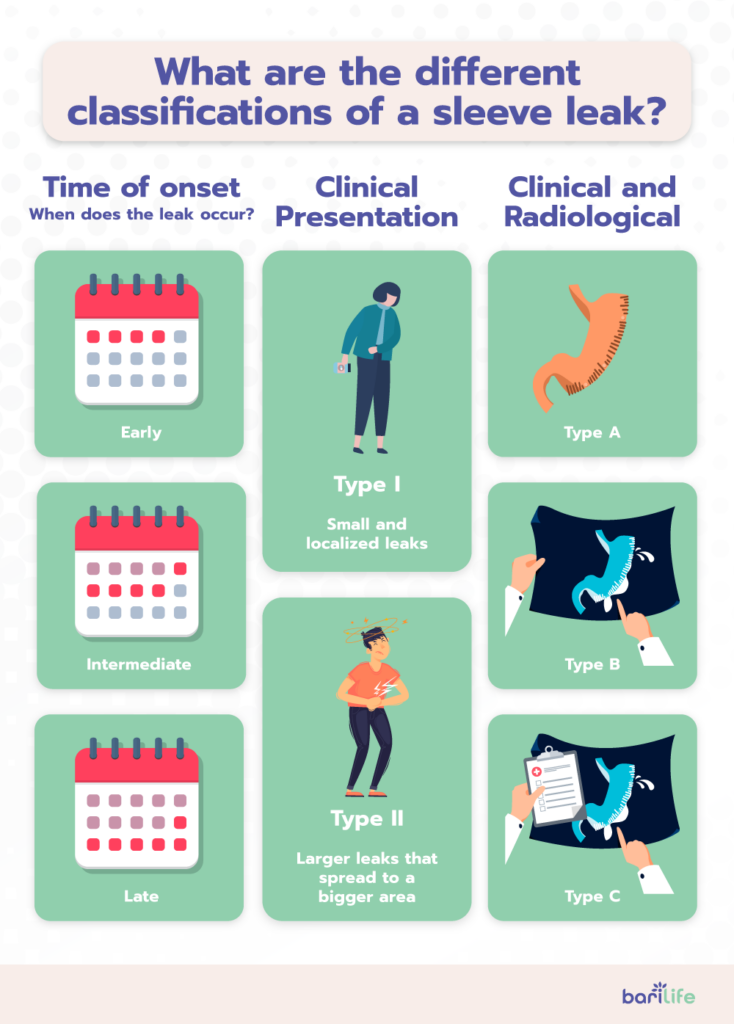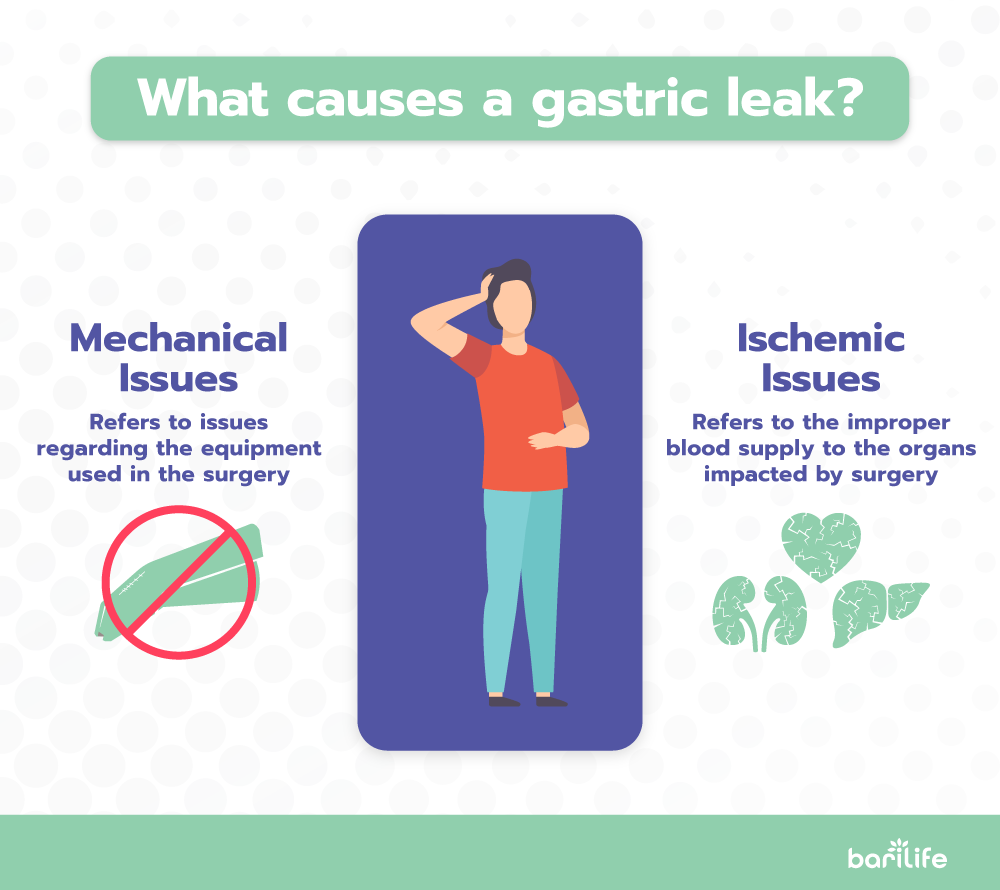Understanding the possible complications of the gastric sleeve can help with early detection and treatment. A gastric sleeve leak is a possible complication, and it has the potential to be very severe depending on the type of leak and the timing of treatment. This article will help you to understand the signs and symptoms of a leak so that you may be able to detect one if it should occur.
What is the Gastric Sleeve?
The sleeve gastrectomy, commonly called the gastric sleeve, is a surgical technique that involves the removal of about 75-80% of the stomach.
During the procedure, the stomach will be shaped into a tube-like structure or a “sleeve” that is about the size of a banana. Reshaping and reducing the size of your stomach have multiple benefits that promote weight loss. Over the years, this procedure has been proven to be safe and effective, but that does not mean that complications or side effects aren’t a real possibility.

What is a gastric sleeve leak?
One complication that can arise following surgery is a leak.
A gastric sleeve leak refers to the leaking of gastrointestinal contents through a suture line. Simply put it means that the contents of your stomach or intestines can be leaking out of the spaces where they sewed your stomach and intestines during the procedure.
Gastric sleeve leaks are considered to be one of the most severe and life-threatening complications.
The good news is, that a gastric sleeve leak is relatively rare. Research suggests that sleeve leaks occur in about 1-3% of patients following the gastric sleeve procedure. Sleeve leaks are more common following revision surgery. It is estimated that leaks may occur in about 10% of patients following revision surgery. (1)

What are the different classifications of a sleeve leak?
Not all sleeve leaks are created equal! Leaks can occur at different times, for different reasons, and they can present in different ways!
It’s important to know the various classifications of a sleeve leak because symptoms can vary depending on the classification.
Gastric sleeve leaks can be defined based on
- Time of onset
- Clinical Presentation
- Site of the leak
- Radiological appearance
- Mix of factors
Timing of onset refers to the amount of time following surgery that the leak occurs.
- Early (1-4 days)
- Intermediate (5-9 days)
- Late (10+ days)
Clinical presentation
- Type I or subclinical leaks
- These leaks are smaller and more localized to a specific area. They usually don’t affect as much of the abdominal cavity, and they are easier to treat medically.
- Type II
- These leaks likely spread to a larger area. They affect the abdominal cavity and can result in severe side effects and symptoms.
Clinical and Radiological
- Type A are tiny perforations without clinical or radiographic evidence of a leak
- Type B are leaks detected by radiological studies but without any clinical finding
- Type C are leaks presenting with both radiological and clinical evidence

What are the symptoms associated with a gastric sleeve leak?
Symptoms of a sleeve leak can vary based on the type of leak that is present.
Common symptoms that you may experience include:
- Fever
- Septic shock including fever
- Abdominal pain
- Peritonitis
- Leucocytosis
- Tachycardia or a rapid heart rate
- Hypotension or low blood pressure
Many studies suggest that fever is the most important factor in the diagnosis of a gastric leak.
While others suggest tachycardia is the earliest and most important factor in indicating the presence of a leak. Research shows that tachycardia above 120 beats/min is a strong indicator of both a leak and systemic compromise.
It is important to know how your body is feeling and functioning following surgery so that you may identify any symptoms indicating a leak.
Research suggests that unexplained fever and tachycardia could indicate a possible leak and should be further evaluated to rule out the presence of a leak. Further evaluation will likely include radiological studies.
Symptoms may vary based on the severity of the leak but also the timing of onset.
Early leaks usually present with sudden abdominal pain, fever, and tachycardia. While late leaks usually present with subtle abdominal pain and are also commonly associated with fever.
So, if you are feeling feverish, have abdominal pain, or have a rapid heart rate it is important to consult with your physician to rule out the presence of a gastric leak.

What causes a gastric leak?
There are two major categories that encompass the possible causes of a gastric leak.
1. Mechanical Issues
2. Ischemic issues
Mechanical issues refer to problems with the surgical equipment or the procedure.
- Examples of this may include Direct tissue injury or stapler misfiring
- Prevention for Mechanical issues may include
- The surgeon utilizes the right type of stapler and the correct cartilage size
- Flex staplers have been suggested in research to be one of the best options in minimizing inadvertent movement and awkward angles when transecting tissues.
- Cartridge choice is another significant factor surgeons must consider when performing bariatric surgery. Under-sizing the staple cartridge increases the risk of inadequate staple formation or can lead to excessive tissue compression, which leads to too much tension on the tissue and causes the tissue to tear or perforate.
- Failure to remove the migratory “crotch” staple is another factor that may cause the stapler to misfire. This staple may appear on long suture lines and must be identified and removed in order to prevent the stapler from misfiring.
- Speed of stapling
- The surgeon utilizes the right type of stapler and the correct cartilage size
- Optimal stapling should allow adequate time for tissue compression and creeping while preventing the production of excessive tension or stress on the suture line. Usually, waiting at least 15 s before firing helps to optimize this concept and allow adequate pre-cut compression time
Ischemic issues refer to the improper blood supply to the organs impacted by surgery
- This can be a result of
- Improper vascularization or formation of blood vessels
- Distal stenosis or the narrowing of the attachment between the stomach and the small intestines. This increases the risk of a leak because the stomach contents cannot flow as easily from the stomach to the intestines causing pressure and potentially leading to a leak.
- Prevention of Ischemic issues includes the use of endostaplers, obtaining homeostasis without damaging tissues when using electrocautery equipment, prevention of distal stenosis
- Studies have suggested that not stapling so close to the gastroesophageal (GE) junction in order to avoid ischemic complications can help to prevent leaks and other complications
- In the international consensus summit for sleeve gastrectomy, 96 % of the panel experts believe that “It is important to stay away from the GE junction on the last firing”, but at the same time not much away to avoid leaving residual fundus.
- Some researchers recommend a distance of 1–2 cm to avoid stapling too close to the esophagogastric junction and they succeeded in eliminating leaks

What can you do to prevent a leak?
Following the proper steps to a healthy recovery can help you to prevent side effects and complications.
Another important factor is to make sure you pick a surgeon who utilizes proper techniques and protocols.
That’s a wrap!
If you are experiencing any of the side effects or symptoms of a gastric sleeve leak, please don’t hesitate to see a physician! Leaks are a relatively rare complication, but leaks do occur and if they go untreated, they can lead to some very severe complications!



What are your tips and tricks to post-bariatric success?